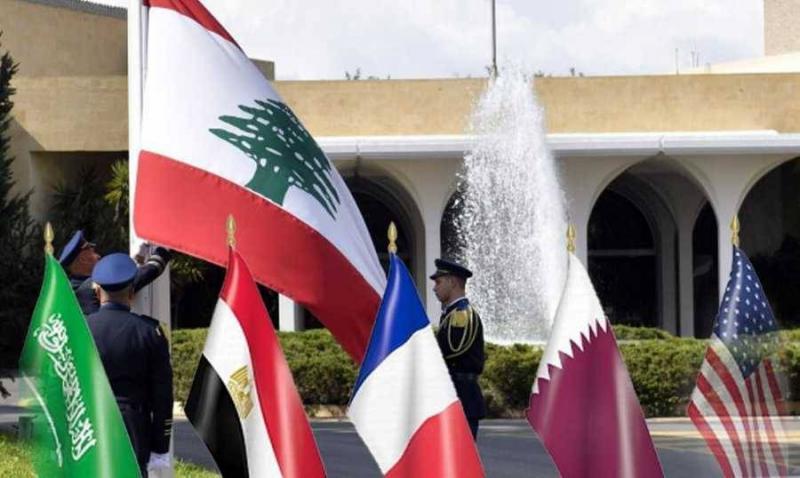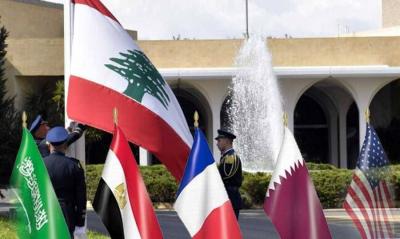The political circles' preoccupation with reactions to the second version of the French paper aimed at restoring calm in southern Lebanon does not mean a decline in interest concerning the task undertaken by the ambassadors of the quintet committee to resolve the presidential impasse surrounding the election of a president for the republic. They remain in contact with the political forces involved in the election process in an attempt to break the deadlock that limits parliamentary sessions from moving forward.
Although the novelty in the second version of the French paper lies in its positive intersection, as stated by a prominent political source to "Asharq Al-Awsat," with the proposals made by American mediator Amos Hochstein, which include a set of common grounds from which calm can be restored in the south, this indicates a convergence between Washington and Paris in favoring the third presidential option. This option has become a belief among the quintet ambassadors and tops their agenda for alleviating the electoral crisis.
In this context, the political source quoted one of the ambassadors of the quintet, stating that most parliamentary blocs are now convinced that the third presidential option is the only solution to end the prolonged presidential vacancy. The source confirmed, as relayed by the ambassador who preferred to remain unnamed, that this month would be crucial regarding the potential advancement of the third presidential option over others. The source indicated that this preference for the option does not solely stem from the quintet ambassadors but rather from their evaluation of the meetings they held with the parliamentary blocs.
The same ambassador revealed that the quintet ambassadors—Saudi Walid Bukhari, American Lisa Johnson, French Herve Magro, Egyptian Alaa Moussa, and Qatari Saud bin Abdul Rahman Al Thani—will submit their report to their foreign ministers at the end of this month, enabling them to determine the necessary actions in light of the instructions they will receive to continue their efforts in electing a president.
According to the political source, based on what he heard from the ambassador, the ambassadors will move again based on a roadmap to be drawn up by their foreign ministers. He mentioned that their report, which they will prepare, would summarize their meetings with both the Speaker of the Parliament Nabih Berri and parliamentary blocs, without entering into the names of candidates or imposing vetoes against any of them, as the election remains solely the prerogative of the representatives.
The source noted that the ambassadors' support for the initiative launched by the Moderation Parliamentary Bloc reflects their desire to back any parliamentary movement aimed at facilitating the election of the president. This aligns with their mission, as they view themselves as a support group for efforts aimed at resolving the electoral impasse. He affirmed that their preference for this option is not based on their personal stance but rather reflects the readiness of the parliamentary majority to pursue it, betting on President Berri's openness and flexible, realistic engagement to facilitate the president's election, especially since he has maintained the importance of consensus when calling for parliamentary dialogue.
He questioned the usefulness of the lack of communication among parliamentary blocs, suggesting that the ambassadors were the first to encourage deputies to meet and consult in hopes of agreeing on a candidate who meets the specifications set by the quintet—one who maintains impartiality and possesses the capability to reconcile the Lebanese in order to halt the country's collapse and set it on the road to recovery.
He also raised concerns about the readiness of the deputies to reach a consensus and how to arrive at the necessary formula for engagement, particularly as the Moderation Bloc's initiative faced division among parliamentary blocs regarding who calls for dialogue and who sponsors it. The initiative has yet to narrow the gap of disagreement, especially as Hezbollah opposes, until further notice, separating the presidential election from the ongoing war in Gaza.
Hezbollah insists that all initiatives begin with the cessation of Israeli aggression on Gaza, as hinted during their meeting with the Moderation Bloc, questioning the timing that prompted them to propose their initiative while developments in the region accelerate. He urged the continuation of their dialogue initiative, noting that the quintet committee, despite its commendable efforts, has yet to achieve a breakthrough that facilitates the election of a president.
Thus, the party has its own timing, contrasting with those insisting on electing a president today rather than tomorrow, to restore order to constitutional institutions, even if they exchange conditions that delay the election. Additionally, the party is not inclined to engage in the presidential election independently of what will happen regarding the situation on the Gaza front, as they seek to ensure that a president emerges who aligns with the potential changes that could arise, although they would not oppose holding election sessions if the candidacy of former lawmaker Sleiman Frangieh from the Marada Movement as president is secured.
Consequently, the presidential election will remain a matter of biding time until the quintet collectively, at the level of foreign ministers, decides what it deems appropriate to stop the obstruction of presidential elections, whether by supporting the third presidential option or establishing new mechanisms to continue their movement. This should put the parliamentarians before their responsibilities to end the presidential vacancy, especially since the chances of betting on internal divisions within the quintet regarding the presidential file, particularly between the United States and France, have diminished. As stated by their sources to "Asharq Al-Awsat," both nations favor adopting the third option initially promoted by French presidential envoy Jean-Yves Le Drian during his recent visit to Beirut.
The question remains: How will the parliamentary blocs respond to the preference for the third presidential option? What role will President Berri play in this regard? And what will the resistance axis, supporting Frangieh, do, affirming its commitment to the battle even if it remains isolated? The hope for divisions within the quintet to sustain itself has dissipated, as signaled by the convergence between the French and American proposals aimed at calming the situation in the south.




